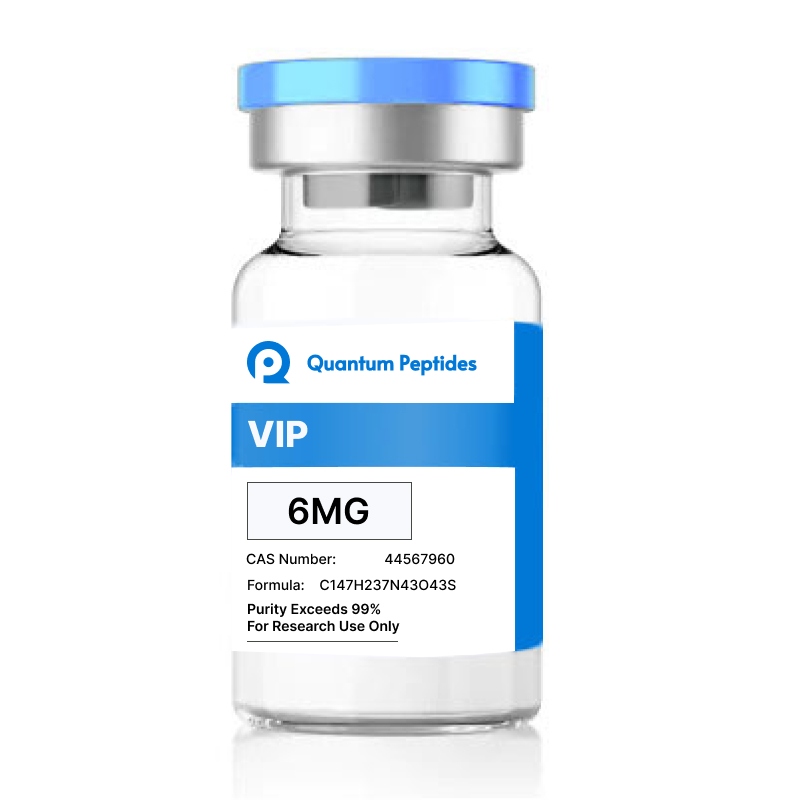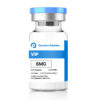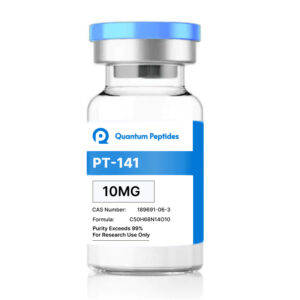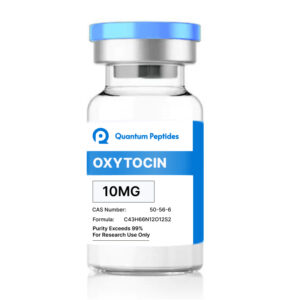VIP (6mg)
$60.00
VIP exhibits noteworthy efficacy in dampening inflammation, with a specific focus on conditions like neurodegenerative disease, pulmonary fibrosis, inflammatory bowel disease, and cardiac fibrosis. Beyond its potent anti-fibrotic properties, VIP acts as a versatile immune system modulator and a broad-spectrum anti-inflammatory agent. Its active role in safeguarding the central nervous system underscores its potential in preserving cognitive function amidst the challenges posed by neurodegenerative diseases.
VIP Peptide and Physiological Roles
Vasoactive Intestinal Peptide (VIP) plays a crucial role in physiology, with its 28 amino acid residues contributing to its diverse functions. Naturally occurring in both peripheral and central nervous systems, VIP exhibits pleiotropic properties as a neurotransmitter, vasodilator, and potential immune regulator and secretagogue. The broad distribution of VIP within the body underscores its multifaceted impact on various physiological processes, making it a focal point of interest for researchers exploring its roles in neuromodulation, neurotransmission, and beyond.
Overview
Researchers have identified that the VIP peptide binds with three distinct G protein-coupled receptors, namely VPAC1, VPAC2, and PAC1. Upon binding to these receptors, the activation of the adenylate cyclase pathway, a key regulatory enzyme, is anticipated, leading to potential biological activity. The localization of these receptors differs, with VPAC1 found mainly in the brain and peripheral areas, VPAC2 expressed in the central nervous system and various peripheral regions, and PAC1 predominant in the brain and adrenal region. This diverse receptor distribution prompts investigations into the impact of VIP binding on different targets within the central and peripheral systems. Ongoing studies are exploring potential effects on blood pressure, smooth muscle dilation in the GI tract, stimulation of water and electrolyte secretion in the intestine, contraction of heart muscle, elevation of glycogen metabolism in the liver, as well as its influence on prolactin secretion, circadian rhythm, neuroprotection against oxidative stress, cardiac fibrosis, and lung function.
Exploratory Investigations and Clinical Trials
VIP Peptide and Neurotransmission
Investigations(7) into the neurological aspects of VIP have unveiled its potential role as a neurotransmitter. The peptide appears to be synthesized and released by neurons within the central nervous system, acting as a neurotransmitter or neuromodulator. Studies have suggested that VIP may contribute to synaptic transmission, participating in the modulation of neuronal excitability and synaptic plasticity. Research indicates that VIP may bind to specific receptors, affecting intracellular signaling pathways and influencing the release of other neurotransmitters. Additionally, VIP has been implicated in circadian rhythm regulation and sleep-wake cycles, suggesting a broader impact on neural function beyond traditional neurotransmission.
VIP Peptide and Gastrointestinal Integrity
The gastrointestinal (GI) tract plays a vital role in nutrient absorption and immune defense. Maintaining the integrity of the GI barrier is essential for preventing the entry of harmful substances and pathogens. VIP, a neuropeptide with diverse functions, has been explored for its potential impact on gastrointestinal health. Research indicates that VIP may contribute to the regulation of gut homeostasis by influencing factors such as intestinal permeability and immune responses within the GI tract. Studies suggest that VIP may have a protective effect on the GI barrier, potentially contributing to the maintenance of gastrointestinal integrity. Understanding the role of VIP in gastrointestinal health could offer insights into novel approaches for promoting gut well-being and preventing disorders related to compromised GI integrity.
VIP Peptide and Neurological Disorders
Neurological disorders often involve complex mechanisms that impact neuronal function and communication. Research(13) has delved into the potential neuroprotective properties of VIP peptide, exploring its impact on various aspects of neurological health. Studies suggest that VIP may exhibit antioxidant properties, counteracting oxidative stress, which is implicated in neurodegenerative conditions. Additionally, VIP appears to influence neurotransmitter balance and modulate immune responses within the central nervous system. The multifaceted actions of VIP may hold promise for addressing neurological disorders, offering potential avenues for therapeutic interventions and neuroprotective strategies.
VIP Peptide and Cardiovascular Function
Research(14) indicates that VIP peptide may play a role in cardiovascular function, extending beyond its well-established vasodilatory effects. Studies have suggested that VIP can influence the regulation of cardiac activity, potentially impacting heart rate and contractility. Additionally, VIP appears to modulate the release of certain cardiac hormones, contributing to the overall cardiovascular homeostasis. The intricate interplay between VIP and cardiovascular function is an area of ongoing investigation, offering insights into the peptide’s broader physiological significance.
VIP peptide is exclusively intended for research and laboratory applications. Prior to placing an order, it is essential to carefully review and comply with the specified Terms and Conditions governing its use.







Reviews
There are no reviews yet.